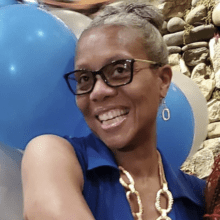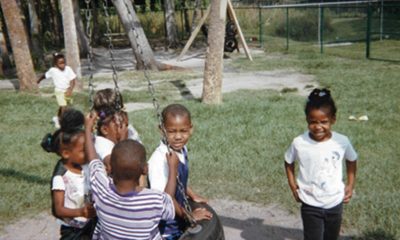#NNPA BlackPress
A Day Without Childcare
NNPA NEWSWIRE — On May 16, we will be closing our childcare centers for a day — signaling a crisis that could soon sweep across North Carolina, dismantling the very backbone of our economy

A Day Without Child Care


By Emma Biggs and Dee Dee Fields
As we end the year, we look back at some of the important viewpoints about early childhood education shared during 2024. Here’s one from leaders in North Carolina that applies on a national level. On May 16, we will be closing our childcare centers for a day — signaling a crisis that could soon sweep across North Carolina, dismantling the very backbone of our economy: childcare. This one-day action, organized by a coalition of partners under Child Care for NC: United for Change, is not merely a protest; it’s a stark preview of the devastating impact awaiting us as federal pandemic-era funding ends. Without decisive action, North Carolina risks losing over 1,500 child care programs, affecting nearly 92,000 children and their families. This isn’t just about numbers; it’s about our state’s future and the lives of the working families who depend on these essential services.
We are not newcomers to this field. With over half a century of combined experience in childcare, we’ve dedicated our lives to the education and well-being of children. From operating small family childcare home centers to managing large facilities, our careers have been built on the belief that every child deserves a nurturing, stimulating environment to grow. Chronic underfunding threatens the very foundation of this belief. I was thrust into the world of childcare out of necessity when I lost my childcare voucher as a single mother. This personal crisis not only led me into the field but has fueled my commitment ever since. At Pathway Preschool Center, we’ve used the latest round of federal funds to improve teacher salaries and enhance our facilities significantly. These changes aren’t just numbers on a page — they mean that parents can go to work knowing their children are in safe, stimulating environments.
This May 16th, we are not only closing our center; we are taking our cause to Raleigh, where we will join hands with many to demand sustained support. Without the necessary funding or resources, I will have to continue raising fees for families and reducing our hours to manage costs; something we just cannot afford to do. I am stepping out because I know my center is not alone in this battle. On May 16th, I’m bringing a busload of staff from my center and the families we serve to share our personal stories, handwrite letters to legislators and speak out about what these cuts mean for not only our community and state but the rest of the country. My question to legislators is this: “Who stands to lose care if you don’t act now?” We will not fail the marginalized Black and brown children who will be the most impacted by your inaction, and until you recognize the value of what early childhood educators do every day, we will not rest.
Like Emma, I started my career in childcare to make a safe space for my daughter and give her the quality experience I envisioned for her. I did not know at the time that there were so many aspects of the profession that were detrimental to childcare providers and that I would face many costly lessons over the years. Even though I still love what I do and hold early childhood education close to me, I am completely drained mentally, physically, and emotionally. As the director of Landeeingdam Daycare Inc., I see every day how crucial adequate funding is to maintain quality care. Thanks to the recent grants, the additional assistance I could afford was a game-changer for our children’s daily educational experiences. Without continued funding, not only might I lose this help, but we may also be forced to cut services or close, decisions that would reverberate throughout our community. On May 16th, I will stand with Emma and other childcare providers at Halifax Mall to share my story and those of the families we serve.
Financial instability is a standard to many in our field, forcing numerous providers and childcare workers to take on second jobs just to make ends meet. Despite our designation as ‘essential’ during the pandemic, this status was short-lived, and the support that once seemed like a breakthrough is now a failed promise. The recent stabilization grants briefly expanded our capabilities and allowed for critical hires that profoundly impacted our children’s daily experiences. Yet, as this funding expires, the risk of reducing services or even closing our centers remains heavy, a decision that would devastate our communities. It’s not just about keeping the doors open; it’s about maintaining a quality of care that includes providing our staff with necessary benefits like paid time off, health insurance, and other essentials that help retain them, ensure their well-being, and ensure a safe and pleasant environment for our children.
The childcare crisis demands more than temporary solutions; it requires a fundamental reevaluation of how our society supports those tasked with caring for its youth. Our firsthand experiences underscore the critical role of childcare as more than just a service — it is an economic driver and a pillar of stability within our communities. The end of federal funding threatens an essential service that is already difficult for many families to obtain. For many centers, particularly those serving low-income families, the end of these funds will mean drastic cuts in services or straight-up closures. We’ve already begun to see the strain on our centers in Charlotte and Durham, where operational adjustments — from reducing hours to increasing fees — are Band-Aid solutions to a bleeding financial wound. The potential closure of childcare centers carries broader implications beyond the immediate disruption to family routines. The economic impact is significant, hampering North Carolina’s recovery and growth when many are still dealing with the pandemic’s lingering effects. The end of stabilization grants threatens the livelihood of thousands of care workers, with nearly three in ten programs facing closure. This is not just a disruption; it is a devastation to the community and economic threads that hold our state together.
Every cut in childcare funding is a cut to a child’s future, a family’s stability, and our state’s economic vitality. Behind the numbers are stories of real people making painful choices: educators like us who love our work but face financial instability and parents who may no longer have access to affordable care. These are not just policy failures; they are personal crises affecting thousands. It is time for North Carolina’s legislators to step forward and recognize childcare for what it is: an essential infrastructure critical to economic stability and deserving of sustained investment. We need a reinvestment in our state’s future through robust support of childcare. This means not only preserving but increasing state funding to ensure that childcare centers across North Carolina can continue to serve their communities without sacrificing quality or accessibility. To our fellow North Carolinians, we ask you to join us, whether in person on the steps of the General Assembly, in spirit or by contacting your representatives. Support us in demanding that our legislators act now to preserve and enhance this vital sector. Our actions today will define the future of our state and the legacy we leave for our children.
We are closing our centers on May 16 to stand up for this cause, but more importantly, to ignite a movement that echoes through every legislative hall and into every corner of our state. This is not just about childcare. It’s about the kind of North Carolina we want to live in. We refuse to step back into a past where childcare is undervalued and underfunded. Instead, we demand a future where our children and families flourish.
Emma Biggs is a member of the National Domestic Workers Alliance (NDWA) and the director of Pathway Preschool Center in Charlotte. Dee Dee Fields is a National Domestic Workers Alliance member and director of Landeeingdam Daycare Inc. in Durham.
#NNPA BlackPress
Supreme Court Decision Confirms Convicted Felon Will Assume Presidency
NNPA NEWSWIRE — In a 5-4 ruling, the court stated that Trump’s concerns could “be addressed in the ordinary course on appeal” and emphasized that the burden of sentencing was “relatively insubstantial” given that Trump will not face prison time. Chief Justice John Roberts and Justice Amy Coney Barrett joined the court’s three liberal justices in the majority, with four conservative justices dissenting.

By Stacy M. Brown, NNPA Newswire Senior National Correspondent
@StacyBrownMedia
The Supreme Court on Thursday rejected President-elect Donald Trump’s emergency request to block criminal proceedings in his New York hush money case, ensuring that a sentencing hearing will proceed as scheduled on Friday. The decision makes it official that, on January 20, for the first time in its history, the United States will inaugurate a convicted felon as its president.
In a 5-4 ruling, the court stated that Trump’s concerns could “be addressed in the ordinary course on appeal” and emphasized that the burden of sentencing was “relatively insubstantial” given that Trump will not face prison time. Chief Justice John Roberts and Justice Amy Coney Barrett joined the court’s three liberal justices in the majority, with four conservative justices dissenting.
Trump was convicted in May for falsifying business records related to a $130,000 payment to adult film star Stormy Daniels before the 2016 election. Manhattan District Attorney Alvin Bragg argued that the Supreme Court lacked jurisdiction to intervene in a state criminal case, particularly before all appeals in state courts were exhausted.
Trump’s legal team claimed the sentencing process would interfere with his transition to power and argued that evidence introduced during the trial included official actions protected under the Supreme Court’s prior ruling granting former presidents immunity for official conduct. Merchan, the New York judge who presided over the trial, ruled in December that the evidence presented was unrelated to Trump’s duties as president.
Prosecutors dismissed Trump’s objections, stating that the sentencing would take less than an hour and could be attended virtually. They said the public interest in proceeding to sentencing outweighed the President-elect’s claims of undue burden.
Justice Samuel Alito, one of the four dissenting justices, confirmed speaking to Trump by phone on Wednesday. Alito insisted the conversation did not involve the case, though the call drew criticism given his previous refusals to recuse himself from politically sensitive matters.
The sentencing hearing is set for Friday at 9:30 a.m. in Manhattan. As the nation moves closer to an unprecedented inauguration, questions about the implications of a convicted felon assuming the presidency remain.
“No one is above the law,” Bragg said.
#NNPA BlackPress
How Head Start Installs Confidence for Two Generations
NNPA NEWSWIRE — Head Start is a changemaker for all communities. Child by child, family by family, the seeds that are sowed continue to blossom as they stretch higher and higher toward the sunshine.

By Olivia Harvey
The founders of Head Start have always viewed parents as critical partners in their work to educate young children. They also understood that this partnership meant parents should help decide which services would most benefit their families and those in the community. As a result, Head Start created a formal leadership and policymaking role for parents and community members called the Policy Council.
Thank you to Head Start parent, Policy Council member, and alumna Olivia Harvey for recently sharing her story.
A few years ago my daughter Maliya was six years old and had just started kindergarten, after graduating from the Children First Head Start program in Sarasota County, Florida. It was hard to believe we’d reached this major milestone, but with all the love, care, and guidance she received from her incredible teachers, I’m confident that she will continue to blossom and thrive. Children First and the Head Start program have always been close to my heart, and the hearts of my family. My husband Malik is also a proud Head Start graduate along with some members of his family. He’s a wonderful support system and understands our shared mission of raising the healthiest, happiest family possible. Our lives are centered around family, and in addition to Maliya, we also have two other children, our sons Jeremiah and King. When we had our kids, we knew we didn’t have to look far to find quality, affordable childcare with amazing teachers we could trust. With the challenges we were facing, we knew we could turn to Children First’s Head Start program to help us find our path to success.
My family has been involved with Children First since Jeremiah was a toddler. Our family advocate, Ernestine, was there for Maliya and our entire family every step of the way. I know that even when my daughter is in high school, Ernestine will be there in a heartbeat if we ever need anything. The teachers care so deeply about the kids, and they never forget their faces. One day, Maliya came home with a photo taken by her teacher, Miss LaTonda. It was a baby picture of me because Miss LaTonda had been my teacher as well. I couldn’t believe she had kept it for all these years! It was such a special memory to share with my daughter, and it’s moments like this that let me know we will always be a part of the Children First family. Through Head Start, I also found a lot of support personally and as a parent. Due to the pandemic, I had reduced hours and was forced to seek other employment. During this time, I needed something that would allow me to feel professional and help me keep my skills up while at the same time offering me the flexibility to be a mom.
Luckily, Children First was offering a Job Skills Training Course as part of the agency’s Family Strengthening services. The class was perfect because it provided a sense of accountability and belonging. I learned about identifying and overcoming obstacles related to employment, and there was a special focus on resume writing, interviews, and ‘acing’ the first 90 days at a new job, which has benefited me! After a mock interview with my vocational family advocate Laura and her colleagues, I felt so confident with the skills that I had learned, and I decided to reach a higher goal in the workforce. I was offered a position at Sarasota School of the Arts & Sciences, where I have been working as a paraprofessional. While working full-time, I’ve also had the opportunity to go back to school to earn my bachelor’s degree to become a history or math teacher. My ambitions have led me to be a working professional, a full-time mom, and now, a student, but I’m not stopping there. In the future, I would like to earn my master’s degree and work as an administrator, with one of my ultimate goals being to run for the school board.
Because of Children First, Head Start, and my vocational coach, Laura, it feels like a whole new world of possibilities has opened. While I was unexpectedly unemployed but fighting to stay engaged, I was supported every step of the way. Laura and the team at Children First continue to guide me and my family on our journey to success. Although we still face unique challenges, I feel grateful and am so proud of how far we’ve come. Because Malik and I were able to grow and thrive in a healthy environment at the earliest stages of our lives, the lives of our children have been transformed for the better. Right now, some parents, families, and caregivers are struggling financially and socially. They need lower childcare prices, full workday hours with childcare coverage, and free transportation to and from daycare.
Head Start is a changemaker for all communities. Child by child, family by family, the seeds that are sowed continue to blossom as they stretch higher and higher toward the sunshine. Their promise is simple: every child, regardless of circumstances at birth, can reach their full potential. As I look to the future — from my youngest child thriving, to earning my teaching degree, to raising my beautiful children alongside my husband and beyond that, I know that thanks to Head Start, there is nothing to fear.
#NNPA BlackPress
Cold Weather Safety for Children
NNPA NEWSWIRE — Keep babies’ cribs free of stuffed animals and blankets. A firm mattress covered with a tight-fitting crib sheet is all that an infant needs to sleep safely.

By The Head Start Early Childhood Learning and Knowledge Center
Children are more vulnerable than adults to the effects of cold weather. The Head Start Early Childhood Learning and Knowledge Center developed these tips to help families and staff keep children safe, healthy, and warm in the winter.
Bundle up!
- Children are at greater risk for frostbite than adults. The best way to prevent frostbite is to make sure children dress warmly and don’t spend too much time outside in extreme weather.
- Dress children in layers of warm clothing. If the top layer gets wet, they will still have a dry layer underneath.
- Tuck scarves inside coats and jackets to prevent them from becoming strangulation hazards.
- Car seats and winter coats don’t mix. Bulky coats can compress in a crash and create a loose car seat harness. Instead, lay the jacket or a blanket over the children once you’ve safely strapped them into their car seat.
Keeping Healthy Outdoors
- There’s no set amount of time for children to play outside safely when the weather is cold. Use your best judgment. When the cold becomes unpleasant, it’s time to go inside.
- If you are unsure if weather conditions are safe for outdoor play, check the Child Care Weather Watch Chart.
- Have children come indoors periodically to prevent hypothermia or frostbite. A temperature of 0 degrees Fahrenheit and a wind speed of 15 mph creates a wind chill temperature of -19 F. Under these conditions, frostbite can occur in just 30 minutes.
- Frostnip is an early warning sign of frostbite. The skin may feel numb or tingly or appear red (on lighter skin).
- To prevent frostbite, check that mittens and socks are dry and warm. Frostbite occurs mostly on fingers, toes, ears, noses, and cheeks. The affected area becomes very cold, firm, and, depending on the color of the skin, turns white, yellowish-gray, or gray.
- Even though it’s cold outside, it’s important to use sunscreen and stay hydrated. Children are more likely than adults to become dehydrated.
Staying Safe Indoors and in Vehicles
- Keep anything that can burn at least three feet away from heating equipment, including furnaces, fireplaces, wood stoves, and portable space heaters.
- Set up a 3-foot “kid-free zone” around open fires and space heaters.
- Remember to turn portable heaters off when leaving the room.
- Test smoke alarms at least once a month.
- Vent all fuel-burning equipment to the outside to avoid carbon monoxide (CO) poisoning.
- Install and maintain CO alarms. Keep alarms at least 15 feet away from fuel-burning appliances.
- If you need to warm up your vehicle, remove it from the garage as soon as you start it to avoid the risk of CO poisoning. Don’t leave a vehicle running inside a garage.
- If vehicles are parked outside, check to make sure the tailpipe is not blocked with snow, which can also cause problems with CO.
Sleeping Safely in Any Season
- Keep babies’ cribs free of stuffed animals and blankets. A firm mattress covered with a tight-fitting crib sheet is all that an infant needs to sleep safely.
- If you are worried about keeping babies warm, dress them in a wearable blanket, also known as a sleep sack.
Infection Control
- Cold weather does not cause colds or flu. However, viruses that cause a cold and the flu are more common in the winter when children spend more time indoors.
- Keeping everyone’s hands clean is one of the most important ways to avoid getting sick and spreading germs to others. Wash hands with soap and clean running water and rub them together for at least 20 seconds.
- Teach children to cough or sneeze into their upper sleeve or elbow, not their hands. Adults should model this behavior.
- Review program policies on handwashing; cleaning, sanitizing, and disinfecting; and excluding children and caregivers who are sick.
- The U.S. Centers for Disease Control and Prevention and the American Academy of Pediatrics recommend that all children 6 months and older receive the seasonal flu vaccine every year. All early care and education program staff should also get vaccinated for the flu.
-

 Activism3 weeks ago
Activism3 weeks agoBooks for Ghana
-

 Arts and Culture4 weeks ago
Arts and Culture4 weeks agoPromise Marks Performs Songs of Etta James in One-Woman Show, “A Sunday Kind of Love” at the Black Repertory Theater in Berkeley
-

 Bay Area3 weeks ago
Bay Area3 weeks agoGlydways Breaking Ground on 14-Acre Demonstration Facility at Hilltop Mall
-

 Activism4 weeks ago
Activism4 weeks ago‘Donald Trump Is Not a God:’ Rep. Bennie Thompson Blasts Trump’s Call to Jail Him
-

 Activism3 weeks ago
Activism3 weeks agoLiving His Legacy: The Late Oscar Wright’s “Village” Vows to Inherit Activist’s Commitment to Education
-

 Alameda County3 weeks ago
Alameda County3 weeks agoAC Transit Holiday Bus Offering Free Rides Since 1963
-

 #NNPA BlackPress4 weeks ago
#NNPA BlackPress4 weeks agoCalifornia, Districts Try to Recruit and Retain Black Teachers; Advocates Say More Should Be Done
-

 Arts and Culture3 weeks ago
Arts and Culture3 weeks agoIn ‘Affrilachia: Testimonies,’ Puts Blacks in Appalacia on the Map




















































